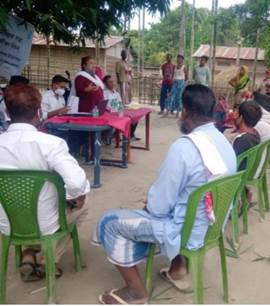JJM Enabling Women’s Participation in Decision-Making in Darrang District of Assam
JJM Enabling Women’s Participation in Decision-Making in Darrang District of Assam
It is often said that the growth of a country depends upon its economy. But the real yardstick to measure the success of any country is how participative its women are in nation-building, as the adage goes, ’build a woman, and you build a nation’.
This case study shows how the women of Darrang district in Assam are setting an example with their active participation in the implementation of Jal Jeevan Mission (JJM).
About Darrang district
The district of Darrang in Assam occupies an important place in the socio-cultural milieu of Assam because of its rich cultural heritage and location, which is strategically located with its proximity to the gateway of Northeast - Guwahati. However, the district could not develop in the way envisaged by its people. Slow development marred its progress on many fronts. To speed up its development at par with other districts, Darrang was included in the Aspirational district programme of the NITI Aayog.
One of the many concerns that Darrang faces is the scarcity of clean drinking water in the rural areas. The quality of water in Darrang is plagued with issues such as Arsenic contamination. This makes the water largely unfit for drinking directly. Adding to its woes is the perennial flood. In rural areas, women are typically the water managers at home and lack of clean drinking water provides many challenges to them, especially and even more so when the water is contaminated with Arsenic.
Jal Jeevan Mission steers development
 With the launch of Jal Jeevan Mission, the State of Assam started implementing the programme in its entire length and breadth with the motto ’Ghare Ghare Bisudha Paani’ (clean tap water in every home). As part of this mission’s framework, Implementation Support Agencies (ISAs) have been engaged to support its execution at the grassroots level. Dhulikona Foundation is one of these ISAs working in Assam.
With the launch of Jal Jeevan Mission, the State of Assam started implementing the programme in its entire length and breadth with the motto ’Ghare Ghare Bisudha Paani’ (clean tap water in every home). As part of this mission’s framework, Implementation Support Agencies (ISAs) have been engaged to support its execution at the grassroots level. Dhulikona Foundation is one of these ISAs working in Assam.
Dhulikona Foundation primarily caters to the smooth and seamless implementation of the mission in Darrang district. It has been engaged in 60 villages spread across nine Gram Panchayats (GPs). It is interesting to note that seven of the nine GPs are led by female presidents. As a part of its programme, Dhulikona Foundation holds introductory meetings in each of the GP offices with the PRI Members, Gaon Burhas, PHED representatives, and other community members. It is very encouraging to witness the GP presidents, primarily the female GP presidents taking the lead and displaying great enthusiasm towards implementing this mission in their respective Gaon Panchayats.
Due to their hardship, women are more conscious of ensuring the basic need of clean and safe drinking water supply in their homes. Upon many interactions with the womenfolk across Darrang, it transpires that the women are aware of the perils that unfit and contaminated drinking water can bring to them and their children. They are equally desirous and motivated to bring about a change.
With its objective to deliver clean and safe drinking water to every household, Jal Jeevan Mission appeals to the women of rural areas at many levels. It would not only ensure safe and clean drinking water for their families but also help them save time hitherto used in search of water. This can enable them to engage in other productive vocations. The fact that most of the GP presidents in Darrang are women has contributed to fuelling their interest in water issues manifold.
Community and cluster meetings are being held in every village allotted to Dhulikona Foundation. GP Presidents, along with field coordinators of Dhulikona Foundation are playing an active role in planning these meetings. Many times, GP Presidents themselves preside over these meetings, making them a huge success. The presidents’ active role also inspires the female ward members to take the lead in the meetings held in their respective wards. Due to this, an increased participation rate of women in the decision-making meetings is observed.
These efforts by the GP presidents and Ward Members have helped tremendously in making the rural population aware of the objectives of the Jal Jeevan Mission. They now know about the functions of the Village Water & Sanitation Committee (VWSC) and the Water Users Committee (WUC). They mobilised the community members to form the VWSC and WUC of the retrofitted schemes. It would not be an exaggeration to admit that the success of this mission primarily lies in the hands of the women. Since the core of the mission is community participation, the increasing interest and participation of women in it are signs of its imminent success. JJM has provided a powerful platform for active women’s participation to ensure ’Har Ghar Jal’.
Source : PIB
Last Modified : 1/6/2023
This topic provides information about All in a Day...
This topic provides information about Vegan Warrio...
This topic provides information about Luminous Liv...
This topic provides information about A Clean Swee...
